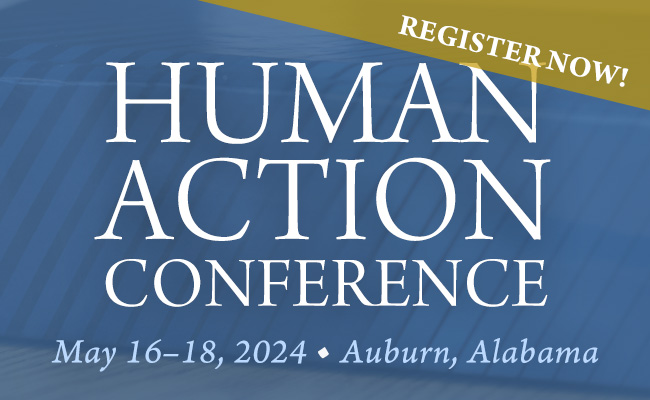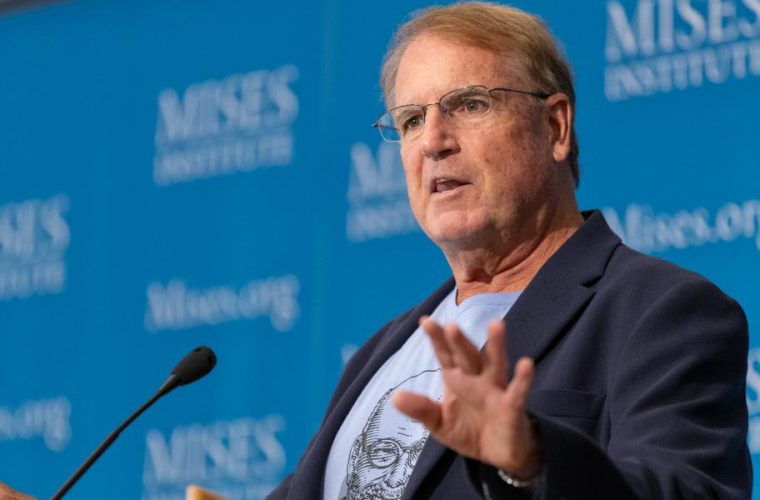
The Promise of Human Action
[This speech was delivered at the Mises Institute on the 50th anniversary of the publication of Human Action in 1999. This year, May 16-18, join Dr. Joseph T. Salerno, Dr. Thomas J. DiLorenzo, Dr. Jörg Guido Hülsmann, Dr. Mark Thornton, and more for a conference in honor of the 75th anniversary of Human Action at our campus in Auburn. Space is limited. Register here.]
Imagine how shocked these same people would be to find that the first edition, reissued 50 years later as the Scholar’s Edition of Human Action, would sell so quickly again.
How can we account for the continuing interest in this book? It is unquestionably the single most important scientific treatise on human affairs to appear in this century. But given the state of the social sciences, and the timelessness of Mises’s approach to economics, I believe it will have an even greater impact on the next century. Indeed, it is increasingly clear that this is a book for the ages.
Human Action appeared in the midst of ideological and political turmoil. The world war had only recently ended, and the United States was attempting to reshape the politics of Europe with a new experiment in global foreign aid. The Cold War was just beginning.
Virtually overnight, Russia went from ally to enemy — a shocking transition considering that nothing much had changed in Russia. It had been a prison camp since 1918 and its largest imperial advances in Europe had taken place with the full complicity of FDR. But in order to sustain wartime economic planning in the United States, and all the spending that entailed, it became necessary for the United States to find another foreign foe. By 1949, the United States began to fight socialism abroad by imposing it at home.
Indeed, on this day 50 years ago, the old idea of the liberal society was gone, seemingly forever. It was a relic of a distant age, and certainly not a model for a modern industrial society. The future was clear: the world would move toward government planning in all aspects of life and away from the anarchy of markets. As for the economic profession, the Keynesian School had not yet reached its height, but that was soon to come.
Socialist theory enthralled the profession to the extent that Mises and Hayek were thought to have lost the debate over whether socialism was economically possible. Labor unions had been delivered a setback with the Taft-Hartley Act, but it would be many years before the dramatic declines in membership would take place. In academia, a new generation was being raised to believe that FDR and World War II saved us from the Depression, and that there were no limits to what the state could do. Ruling the land was a regime characterized by regimentation in intellectual, social, and political life.
Human Action appeared in this setting not as polite suggestion that the world take another look at the merits of free enterprise. No, it was a seamless and uncompromising statement of theoretical purity that was completely at odds with the prevailing view. Even more than that, Mises dared to do what was completely unfashionable then and now, which is to build a complete system of thought from the ground up. Even Mises’s former students were taken aback by the enormity of his argument and the purity of his stand. As Hans Hoppe has explained, some of the shock that greeted the book was due to its integration of the full range of philosophy, economic theory, and political analysis.
When you read Human Action, what you get is not a running commentary on the turmoil of the time, but rather a pristine theoretical argument that seems to rise above it all. To be sure, Mises addresses the enemies of freedom in these pages — and they happen to be the same enemies of freedom that surround us today. But much more remarkable is the way he was able to detach himself from the rough-and-tumble of daily events and write a book restating and advancing a pure science of economic logic, from the first page to the last. It contains not a word or phrase designed to appeal to the biases of the world around him. Instead, he sought to make a case that would transcend his generation.
To appreciate how difficult this is to do as a writer, it is useful to look back at essays we may have written last year or 10 years ago. Quite often, they have all the feel of their time. If any of us have written anything that can hold up 5 years later, much less 50, we should feel extremely happy at our accomplishment. And yet Mises sustained a 1,000-page book on politics and economics that doesn’t feel dated in the least — or at least that was the consensus of the students we recently had in our offices to reread the entire work.
Consider Samuelson’s Economics, which made its first appearance in 1948. It’s no accident that it’s in its 16th edition. It had to be continually updated to fix the theories and models that events rendered anachronistic in only a few years. Even as late as 1989, the book was predicting that the Soviets would surpass the Unitd States in production in a few years. Needless to say, that had to go. Last year, a publisher brought out the first edition — as a kind of museum piece, the way you might reproduce an old phonograph record. In any case, it didn’t sell well.
Incidentally, when John Kenneth Galbraith reviewed Human Action in the New York Times, he called it a nice piece of intellectual nostalgia. Interesting. Does anyone read any of Galbraith’s books today for any other reason? Our purpose in reissuing the first edition, on the other hand, was not nostalgia: it was to introduce a new generation to what it means to think clearly about the problems of social order. We still have so much to learn from Mises.
I think we need to reflect on what it required of Mises personally to write the book. He had been uprooted from his homeland, and much of his beloved Europe was in tatters. Well past midlife, Mises had to start over, with a new language and a new setting. It would have been so easy for him to look around at the world and conclude that freedom was doomed and that his life had been a waste.
Try to imagine the intellectual courage it required for him to sit down and write, as he did, an all-encompassing apologia for the old liberal cause, giving it a scientific foundation, battling it out with every enemy of freedom, and ending this huge treatise with a call for the entire world to change direction from its present course onto an entirely new one.
I’m sometimes accused of having an excessively pious devotion to the man Mises, but it is impossible not to notice, in the thicket of his dense argument, that he was also a singular character in the history of ideas, a man of uncommon vision and courage.
When we honor Human Action on this great anniversary of the book’s publication, we must also honor the fighting spirit that led him to write it in the first place, and to see it through to its miraculous publication.
What are the political and economic trends that have come to pass in the last 50 years? The rise of new technologies, whose existence are best explained through a Misesian theory. The collapse of the Soviet Union and its client states, for the reasons explained in this book. The failure of the welfare state, again foretold in these pages. The widespread disappointment in the results of positivist methods in the social sciences, also addressed here.
Indeed, if we look at the failure of the welfare state, the persistence of the business cycle, the hyperinflation in Asia, the collapse of currencies in South America, the benefits we’ve derived from deregulation in our own country, and the meltdown of social-insurance schemes, we’ll see that each is addressed and predicted in Human Action. Again, each is discussed in terms of timeless principles.
But none of these issues touch on what I find to be the most encouraging trend of our time: the decline in the moral and institutional status of the central state itself. Quite often in the press these days, pundits decry the rise of cynicism and antigovernment feeling among the public. But what does this really mean? Surely not that Misesian theory has come to capture the imagination of the masses. We are a long way from that. What they are decrying is the end of the old intellectual and political regime that was just coming into its own when Mises’s book appeared in 1949, and has been breaking apart since at least 1989.
The same level of respect is not shown to leaders in Washington as it was in those years. Involvement in politics or the civil service is not valued as highly. In those days, the state got the best and brightest. These days, it gets those who have no other job prospects. The public sector is not the place to look for bandwidth. Moreover, hardly anyone believes that central planners are capable of miracles anymore, and the public tends to distrust those who claim otherwise. The political rhetoric of our time must account for the rise of markets and private initiative, and acknowledge the failure of the state.
Now, there are exceptions. There is the Bill Bradley campaign, which, as far as I can tell, is driven by the idea that Clinton has cut the government too much! And then there are the conservatives at the Weekly Standard. Last week’s issue called for something new: what they have dubbed “One Nation Conservatism.” The idea is to combine the conservative domestic statism of George W. with the conservative foreign-policy statism of John McCain. This is what might be called the politics of the worst of all worlds.
The entire approach fails to come to terms with a central insight of Mises’s treatise: namely, that reality imposes limits on how expansive our vision of government can be. You can dream about the glories of a society without freedom all you want, but no matter how impressive the plans look on paper, they may not be achieved in the real world because economizing behavior requires, most fundamentally, private property, which is the institutional basis of civilization.
Government is the enemy of private property, and for that reason becomes the enemy of civilization when it attempts to perform anything but the most minimal functions. And even here, Mises says, if it were possible to permit individuals freedom from the state altogether, it should be done.
People were not ready for that message then but they are more ready for it now, because we live in times when government routinely confiscates one-half or more of the profits associated with entrepreneurship and labor. Politics consists of 100,000 pressure groups trying to get their hands on the loot. Why would anyone believe that it would be a good idea to expand this system?
Let me read you the rationale for this One-Nation Conservatism. It will inspire people to throw themselves into what they call public service. Public service has four main merits in their view: it “forces people to develop broader judgment, sacrifice for the greater good, hear the call of duty, and stand up for their beliefs.”
These are all desirable traits. But I fail to see how they have anything to do with politics. Rather, a politicized society tends to produce the opposite: narrow judgment, selfishness, petty graft, and compromise. And that’s putting the best-possible spin on it.
Who are the real visionaries today? They are software developers, communications entrepreneurs, freedom-minded intellectuals, homeschoolers, publishers who take risks, and businessmen of every variety who have mastered the art of serving the public through excellence — and doing it despite every obstacle that the state places in their way.
The real visionaries today are the people who continue to struggle to live normal lives — raising children, getting a good education, building healthy neighborhoods, producing beautiful art and music, innovating in the world of business — despite the attempt by the state to distort and destroy most of what is great and good in our world today.
One of the great rhetorical errors of Mises’s time and ours has been to reverse the meaning of public and private service. As Murray Rothbard pointed out, private service implies that your behavior and your motivation is about helping no one but yourself. If you want an example, tour the halls of a random bureaucratic palace in DC.
Public service, on the other hand, implies a voluntary sacrifice of our own interests for the sake of others, and I suggest to you that this the most overlooked feature of a free society. Whether it is entrepreneurs serving their customers, parents serving their children, teachers serving their students, pastors serving the faithful, or intellectuals serving the cause of truth and wisdom, we find an authentic public ethic and a real broadness of judgement; it is in the voluntary nexus of human action where we find the call of duty being acted on. It is here we find people standing up for their beliefs. It is here we find true idealism.
It was Mises’s firm conviction that ideas, and ideas alone, can bring about a change in the course of history. It is for this reason that he was able to complete his great book and live a heroic life despite every attempt to silence him.
The scholarly followers of Mises in our own time exhibit these traits, and inspire us every day with their innovative, principled, and radical approach to remaking the world of ideas. In their work for the Quarterly Journal of Austrian Economics, in their books, and in their teaching we see the ideals of Mises being fulfilled.
At a low point in his life, Mises wondered if he had become nothing but a historian of decline. But he quickly recalled his motto from Virgil: “Do not give in to evil, but proceed ever more boldly against it.” With Human Action, Mises did just that. He was to die around the time that Nixon went off the gold standard and imposed wage and price controls, to Republican cheers. He didn’t live to see what we see today — nothing short of the systematic unraveling of the statist enterprise of our century — but he did foresee that hope was not lost for the flourishing of human liberty. For that great virtue of hope, we must all be very grateful.
Let me also say how grateful I am to everyone involved in the production of the Scholar’s Edition on this 50th anniversary, from our members to our faculty to our staff. Mises smiles today.
[This speech was delivered at the offices of the Mises Institute, September 14, 1999, the date on which Human Action was published 50 years ago. The Mises Institute published the pocket paperback edition in November 2010. ]



